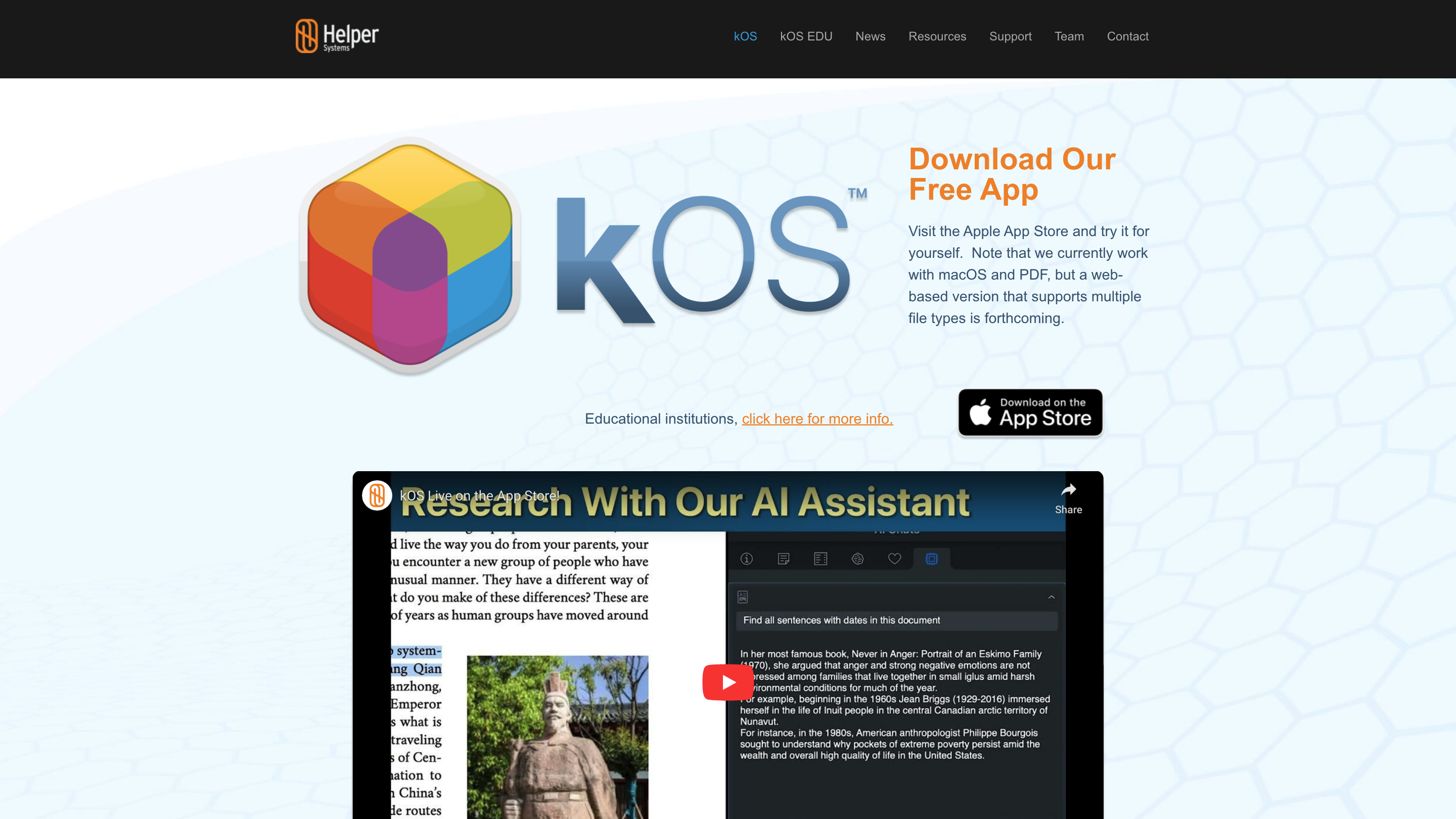kOS
Open siteOffice & Productivity
Introduction
Unlock PDF potential with kOS.
kOS Product Information
Helper Systems – Improve Your Research, Provide Proof of Work
Helper Systems has developed kOS (pronounced chaos), a research-centric platform designed to restore trust between students and faculty by providing verifiable proof of work and ethical AI usage. The system focuses on organizing, annotating, and presenting research materials (notably PDFs) while enabling users to demonstrate the provenance and process behind their findings.
Overview
- Purpose: Enhance academic integrity and streamline the research workflow by offering a self-contained environment that can index, annotate, summarize, and present research results without requiring constant internet access.
- Core idea: Enable students to prove how their conclusions were reached, show their reasoning process, and easily share citations and excerpts with instructors or peers.
- Accessibility: Primarily described as macOS and PDF-oriented, with a forthcoming web-based version that will support multiple file types.
What it does
- File ingestion: Add PDF files from desktop, shared drives, or the web.
- Annotation: Highlight, annotate, and organize content within PDFs.
- AI-aware workflow: Use AI responsibly to distinguish between information generated from the researched material versus the web.
- Presentation: Instantly create presentations that summarize and share resources.
- Proof of work: Build presentations that showcase the research process.
- Privacy-first: Does not rely on external servers; functionality can operate offline.
- Sharing and citations: Automatically copy and share citations, link back to the kOS database, and facilitate cross-device sharing.
- Exploration: Browse and analyze large sets of PDFs efficiently via innovative folder concepts, word clouds, indexes, and TOCs.
Key Concepts and Features
- Folders reimagined: Instant access to table of contents, document thumbnails, word cloud, and word occurrence indexes across documents.
- Context and insight: Visualizes words, phrases, and concepts to aid understanding.
- Private by design: Local-first approach with offline capability to protect privacy.
- Proof of work: Documents the research process and allows the user to present it clearly.
- Cross-device sharing: Citations and excerpts can be shared across devices and apps.
- AI-guided research: Use case-specific AI features to enhance discovery and summarization while maintaining ethical guidelines.
Premium vs Free features
- Free features: Gather and index PDFs, explore content via TOCs, thumbnails, and word clouds, ask questions to the AI about documents, and generate slide presentations from document playlists.
- Premium features: Expanded AI capabilities (ask about specific documents, sections, pages, or excerpts; read summaries; advanced phrase builder; discover common terms across documents; noise reduction in word clouds; highlight and annotate excerpts with tags/comments; create multi-part excerpts; advanced search, editing, and reordering of notes; spotlight highlights in presentations and export to video; editable TOCs; embed linked documents; export metadata-driven CSVs; archive and customize kBases).
- Pricing: Free access with a 6-month premium trial, followed by a $9.99 per month subscription.
How it works
- Gather: Collect PDFs into kBases (repositories).
- Index and navigate: Use TOCs, thumbnails, and word clouds to navigate and filter content.
- Annotate and summarize: Add notes, tags, comments, and summaries generated by AI.
- Prove and present: Build presentations that demonstrate the research process and cite sources.
- Share: Export excerpts, citations, and documents to collaborators or other apps with traceable provenance.
Privacy and Safety Considerations
- Local operation: The system emphasizes a private, server-free environment, reducing data exposure.
- Responsible AI use: Encourages clear differentiation between AI-generated content and information sourced from the web.
- Academic integrity: Aims to help students prove their work while supporting faculty in evaluating the research process.
Platform and Availability
- Desktop: macOS focus with PDF support.
- Web: A forthcoming web-based version will expand file-type support and accessibility.
- Access: Free features available; premium is optional with a trial period.
How to Get Started (high level)
- Install or access kOS on macOS (and await web version for broader file support).
- Create a kBase (repository) and import PDFs.
- Use table of contents, thumbnails, and word clouds to explore.
- Annotate, highlight, and add notes as you read.
- Build a presentation that showcases your research process and export/share as needed.
Disclaimer
- This tool is designed to improve research workflows and support academic integrity. Usage should comply with your institution’s policies and ethical guidelines.
Features
- Local-first, privacy-focused architecture (no servers required for core functionality)
- PDF ingestion from multiple sources (desktop, shared drives, web)
- Rich document organization with TOCs, thumbnails, and word clouds
- AI-assisted annotation, summarization, and insight discovery
- Proof-of-work generation to document research processes
- Quick presentation generation from document playlists
